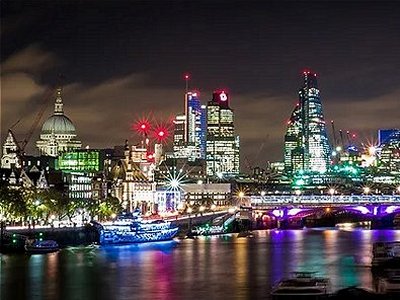
IF SOCIAL MEDIA WERE A CITY, WHAT WOULD IT LOOK LIKE?
We shape our buildings; thereafter they shape us, observed Winston Churchill.
The same can be said for our digital architecture. This didn’t fall from heaven as a gift; it was designed by human beings who did not anticipate how it would be used.
Were we to visualise the internet as physical architecture, what would we see? In the early years, it felt like a beautiful new open space in which to move. People could build their own homes with no limit to cost or self-expression. We were given access to libraries and museums, family and friends, without any of the burdens of travel.
Though architects try to encourage community, cities evolve and begin to entrench division, separation and danger. Waking up to this reality online has been a dawning process. No adult would want their child to play alone outside at night on dark, anonymous streets, but many were content to give their children a laptop to explore similar digital streets in the privacy of their bedrooms, until they realised the risk.
The internet has sprawled like a vast metropolis. A poor architect plans buildings and spaces without anticipating what they will do for relationships. The internet’s designers have coded in some shocking defects, with a difference. The rest of us don’t know much at all about the philosophy behind the design. The algorithms that direct and channel our desires; anticipate our moods, shape our future. These are all closely guarded secrets in top Silicon Valley firms. The spin is how it brings us all closer together; the reality is more unsettling.
The big social media firms know us better than we know ourselves, and curate our feeds to ensure we find the things that will help us, interest us and above all, keep our attention, ensuring advertising revenue. A good way of holding someone’s interest is giving them things that makes them feel great. An even better way is to feed them stuff that makes them angry and indignant. In this way, our brain divides the world in judgment between sheep and goats. We are reinforced in our beliefs, but also in our prejudices, and all for someone else’s profit.
People gather in similar looking groups and like-minded places in cities. It used to be in quarters, but urban places are ever more thinly divided, even down to streets. We like to be surrounded by people who look and sound like us or, to put it an uglier way, we prefer not to be near people who are different to us. These developments happen over decades in a city, and can flow one way and then the other.
Online, this has happened much quicker and more violently. Culture and media are shared goods. It is naïve to say they united us before the internet, but online they are turning to civil war on some platforms. We find parts of the landscape that suit us, surrounding ourselves with similar people in a process of painless selection – following, unfollowing, friending, unfriending. The city is ghettoised.
We face many existential differences in life round politics, religion and identity. It hurts to listen carefully to the views of someone we disagree with. We would much rather not pay attention to them or spend that attention on the righteous anger we feel, and the internet’s architecture helps us to do both. Meanwhile, true debate where each side is open to the other, is squeezed out.
The polarisation this creates is seen most painfully in the United States, the origin of the tech revolution. It is spreading rapidly here in the UK. There are several ways to tackle it. Those who believe in Jesus should choose carefully what they look at. That has traditionally meant distinguishing between purity and impurity, but there is a whole new game online today around learning from people we disagree with and exposing ourselves to views we may find uncomfortable.
There is something very practical in the decision to follow someone on Twitter we don’t agree with but who might have something to teach us and not unfriending someone on Facebook because we don’t like their views on Brexit. Closing ourselves off to conversions in life makes evangelism something of a double standard. It also makes the digital city a more dangerous place to live.
POPULAR ARTICLES

Obama's Covert Wars
The use of drones is going to change warfare out of all recognition in the next decades.

Through A Glass Starkly
Images of traumatic incidents caught on mobile phone can be put to remarkable effect.

What Are British Values?
Is there a British identity and if so, what has shaped the values and institutions that form it?


